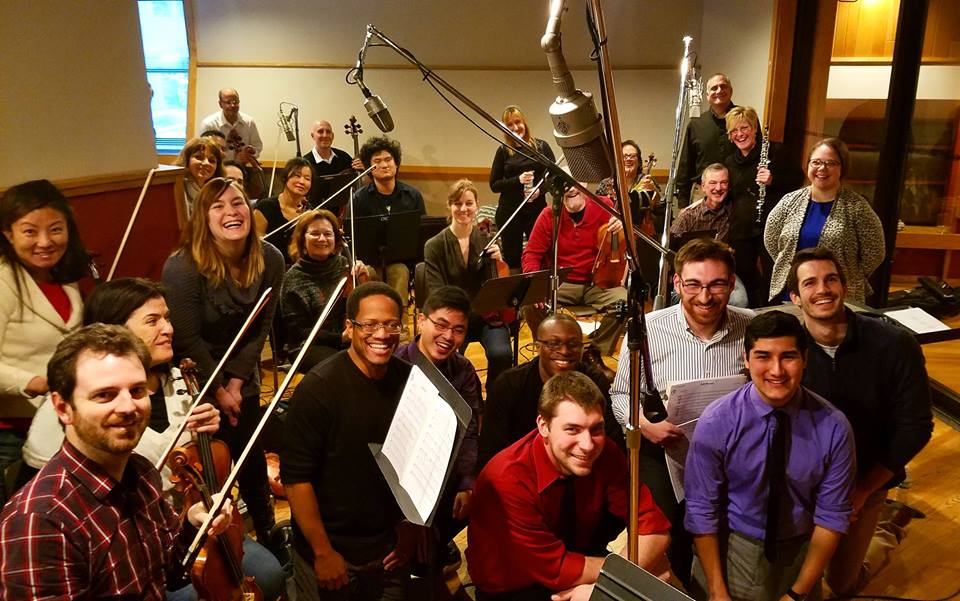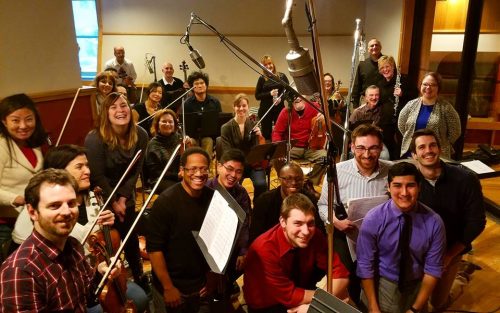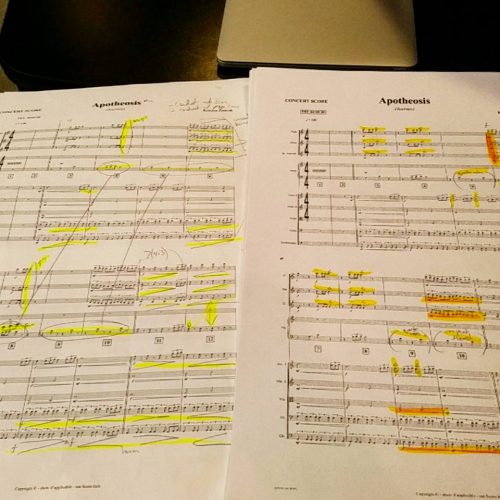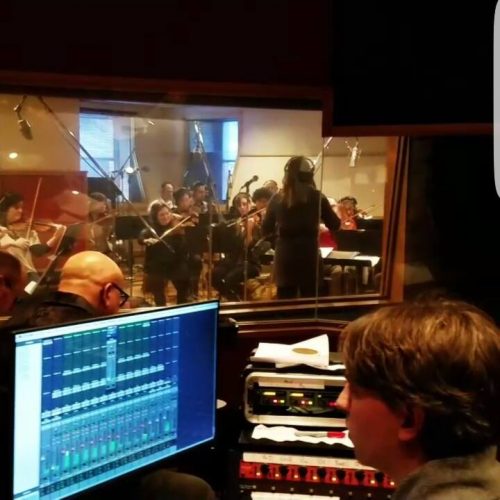
Our First Recording Session

(The 2nd year class with the wonderful musicians at the first recording session!)
Hello Everyone!
I hope that you all are well and are having a wonderful Holiday as well as getting those applications finished! This past semester was one of the most amazing experiences I have had in this program to date. My class, the second year, had their first recording session. We re-scored a part of the game Journey, and with all of our individual styles, it was a wonderful experience. Not only did we compose the pieces recorded, but we also conducted our pieces. The process for all of us was generally smooth, although of course there is always a need for revision and editing. I think my favorite part about the process was when we were finished with our pieces. We all swapped each others scores and parts and revised them. This was one of the greatest learning opportunities. I found that there are multiple ways of notating dynamics and crescendos and decrescendos depending on the effect that you want. My peer, Harry, notated his crescendos with a dynamic at the beginning and end every time, whereas in my score I notated my crescendo within two measures and put similar in the third measure. When we were editing each others parts we wondered which way was the correct way, but it turned out because of the effect of subito piano that I utilized, both ways of notation were correct. I thought it was quite fascinating looking at so many of my peers scores, because it was a great experience to see what exactly works vs. what doesn’t, and also to gain a better idea of bowings, notation, and breathing notation for winds.
Here is a copy of my score after one of my revisions. There’s something so beautiful about printing out a score and looking at every little detail and really taking a look at every inch of the piece. This not only gives you a chance to really revise every inch of the score, but it also gives you the chance to learn something new about your piece every time. The editing process really links into the recording session as well, it helps with the conducting process, and helps with knowing what may be an issue while in the recording session. But of course you hope all of the issues you may have are gone by the time you are in the studio session. Alas, that is not always the case, so learn your piece well and be prepared for any question you may receive! (Copyright Katrina Zemrak 2016)

We worked so hard the whole semester in our conducting class. We started every conducting class off with listening exercises in order to train our ear to hear discrepancies during a recording session or rehearsal. At first this seemed a little daunting, but over the course of the semester it got easier every time. Every class we also worked with fixed Do solfege. This consisted of C always being Do, regardless of key. We would have exercises in different clefs where we would perform solfege in a monotone voice at 120 bpm. We started off in quarter note practices, and then would transition to eighth note practices. This helped create a consistency with singing to musicians in a specific BPM, as well as practicing, and taught us to be able to do fixed Do solfege in any clef. We then applied this practice to our singing exercises. These were tough for many of us, as we aren’t professional vocalists. But that’s what practice is for right!? Conducting is all about posture, confidence, and guidance, and by the end of the semester, you could tell that all of us were a lot more confident in ourselves as composers, as well as conductors and with the vocal collaboration you need to have with a musician. We also conducted many short musical pieces throughout the semester. These pieces were generally in 3/4, 2/4, or 4/4, and had different dynamics, cues, and crescendos/decrescendos. A lot of us were worried by the time we had to conduct our recording session, though. We only worked through our pieces within the last week or two of class before our session. A lot of us had pieces that were composed in 7/8, 6/8, etc., and transitioned from one time signature to another quite quickly. Although we didn’t go through these time signatures very much in class over the course of the semester, as well as transitioning from one to another, we all rocked the conducting session. Everything that we had learned in class prepared us more than we had even known, and we were all able to conduct very well and with ease. Allen Tinkham, our conducting teacher, was also at the session with us, so if we had any problems, he was there to help us. It was such a joy having Allen as a teacher, he’s incredibly passionate, is a true motivator, and really pushes us to work hard. A HUGE thank you to Kubi Uner, Dan Dehaan, and Drew Edwards as well. Without them, we wouldn’t be where we are now. Every teacher we had this semester was at the recording session with us. I don’t think there are any words to let them all know how incredible they are. They push us, they motivate us, they guide us, and they are there for us in any way possible. You will never have such an incredible sense of family at any other school, I promise you.
(Here I am conducting my piece, Apotheosis, at Chicago Recording Company at our first recording session)

Hope you all have a wonderful New Year!
